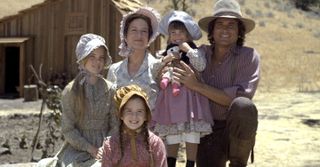Diginets Come of Age

WHY THIS MATTERS: Diginet purveyors have created multimillion-dollar businesses by converting extra spectrum and — at least initially — library programming into free over-the-air networks.
Updated: Monday, Nov. 19, 9:15 am PT
As the audience for diginets grows, so do their programming offerings.
And diginets’ audiences are growing, make no mistake. While the nets — also known as multicast networks — got their start due to the availability of spectrum and extra channels when high-definition television came online, they have grown their businesses due to the unexpected rise of so-called cord-cutters and cord-nevers.
Instead of subscribing to expensive cable packages, cord-cutters, or people who abandon their cable subscription, and cord-nevers, or those who’ve never subscribed to cable in the first place, figure out other ways to watch television. One way that is growing in popularity is pairing inexpensive over-the-air antennas with over-the-top streaming subscriptions.
For example, a user could put an antenna on his house and then subscribe to advertising-supported Hulu for $7.99 per month, thereby creating a virtual cable package composed of over-the-air linear broadcasters, including ABC, CBS, Fox, NBC and The CW, as well as multicast networks, such as MeTV, This TV, Antenna TV, Cozi TV and many more.
The share of U.S. households that acquire their TV signals via over-the-air antenna increased to 20% — or about 24 million homes — from 16% from early 2015 through the end of 2017, according to Parks Associates data from March.
Broadcasting & Cable Newsletter
The smarter way to stay on top of broadcasting and cable industry. Sign up below
“If you put yourself in the shoes of someone who can’t afford or chooses not to subscribe to cable or satellite, an entertainment option with a free price point becomes popular,” Katz Networks president and CEO Jonathan Katz said. “It’s a pairing that has organically happened as consumers have combined these two platforms into their own bundle.”
In August 2017, The E.W. Scripps Co. acquired the 95% of Katz it didn’t already own, including four multicast networks, Bounce, Escape, Grit and Laff, and subscription streaming service Brown Sugar, for $302 million. With the additional cash infusion, Katz has been able to accelerate its programming acquisitions.
For example, in November, Bounce acquired all seven seasons of Shonda Rhimes’ Scandal from Walt Disney Direct-to-Consumer & International, which it began airing in primetime on Monday, Nov. 12.
Katz also has acquired Disney’s According to Jim, to premiere on comedy-focused network Laff in 2019, joining Home Improvement, 3rd Rock From the Sun, That ’70s Show, The Drew Carey Show, Night Court, Spin City and more.
On Jan. 1, 2019, female-focused Escape is adding the first 12 seasons of Law & Order and every episode of Boston Legal to a programming lineup that also includes Without a Trace.
And Western network Grit will add Warner Bros.’ movie library of Westerns to its schedule.
Bounce also is the first diginet to expand into original scripted series and movies, Katz said.
Over Thanksgiving weekend, it will premiere holiday movie Stone Cold Christmas, a modern and female-driven take on Charles Dickens’ A Christmas Carol. On Monday, Jan. 7, it will premiere half-hour series Last Call, starring Empire’s Charles Malik Whitfield as an ex-NFL player who opens a comedy club. Last Call joins a slate of original series that includes Saints & Sinners, Family Time and In the Cut.
Netting Nostalgia Viewers
While the Katz networks are growing quickly, the highest-rated and best-distributed diginet continues to be Weigel Broadcasting’s MeTV, which airs nostalgia programming such as Charlie’s Angels, Big Valley, Bonanza and The Beverly Hillbillies. In the coming months, MeTV will launch its first original program, which it is producing in-house.
Besides MeTV, Weigel offers diginets Heroes & Icons, Movies and Decades. MeTV was one of the first diginets to launch and continues to offer nostalgia fare, along with competitors such as This TV, Antenna TV and Cozi TV.
In September, Weigel launched Start TV in partnership with the CBS-owned stations. The network airs scripted crime dramas that target women, such as The Closer, The Division, Early Edition, Family Law, Joan of Arcadia, Medium, Profiler, Touched by an Angel and Dr. Quinn, Medicine Woman.
Start TV already has done well enough that it will be nationally rated by Nielsen come December. In January, it will add five shows to the schedule, including The Good Wife and Crossing Jordan.
“We continue to schedule dramas with women in leading and significant roles,” Weigel vice chairman Neal Sabin said. “That’s one of the reasons we think the network has resonated so well with women. The network was correctly positioned at the right time.”
Another network that got its start largely as a nostalgia net, NBCUniversal’s Cozi TV, is starting to program more recent series. On Jan. 1, it will launch sitcom The Office.
“It’s a bold, innovative show that has proven to be rewatchable and has such a fan following,” Cozi TV senior VP Meredith McGinn said.

Cozi airs classic sitcoms in primetime blocks, having found that viewers stick around for them. During the day, it airs dramas such as Murder, She Wrote and Little House on the Prairie. The diginet is available in more than 90 million homes and in 82% of the U.S.
The flip side of the Cozi coin is Spanish-language diginet TeleXitos, which launched in December 2014 and offers classic English-language series and movies dubbed in Spanish. So, U.S. Hispanics who enjoyed shows such as Miami Vice and Law & Order when they were growing up in their home countries can enjoy those shows again in their native language and with their families. TeleXitos just debuted Buffy the Vampire Slayer, also dubbed in Spanish.
“The beauty of this network is that it offers viewers another option, something else to watch,” TeleXitos senior director Barbara Alfonso said. “Our brand is not nostalgia, it’s action-adventure.”
To that end, TeleXitos also programs movies, also dubbed in Spanish, and often packages them to serve as cross-platform promotion for other NBCUniversal interests.
For example, last summer TeleXitos aired the Jurassic Park movies in Spanish on “prehistoric Fridays” just as NBCUniversal was rolling out global blockbuster Jurassic World: Fallen Kingdom. This holiday season, TeleXitos will offer “Legends of the Desert,” featuring such franchises as The Mummy and The Scorpion King.
Getting Specific
Beyond the nostalgia networks, niche channels offer specific programming targeted at distinct audiences, such as Cooper Media’s Justice and Quest networks. Justice programs true-crime series targeting women 25 to 54, while Quest offers reality shows geared toward men, such as Ice Road Truckers: Deadliest Roads, Modern Marvels and Storm Chasers. Because diginets are most often watched by cord-cutters and cord-nevers, these networks offer such viewers shows they can’t get because they are only available with a linear pay TV subscription.
“What we did when we built Justice, and then Quest three years later, we looked at what the options were for viewers across cable and streaming platforms,” Cooper Media VP of strategy and distribution Brian Weiss said. “The true, screaming needs, as far as we were concerned, for over the air was crime. There’s a huge, loyal audience for crime, and there was nothing on broadcast that was 24/7 true crime.
“Fast-forward three years later, if you look at Nielsen trends across cable, broadcast and streaming media, there’s nothing really available on broadcast or Netflix and Hulu that falls into the category of male-oriented factual entertainment,” he continued. “It felt like a nice niche for us to fill that no one else has touched.”
Another niche diginet is FremantleMedia’s Buzzr, which packages the company’s nostalgic game shows, such as vintage Family Feud, Supermarket Sweep, Password and many more. Earlier this year, it added Celebrity Name Game, hosted by Craig Ferguson, after it had completed its three-season syndication run.
“We’re all running shows that tap into some sort of nostalgia or some sort of niche audience,” Buzzr general manager Mark Deetjen said. “Nobody’s really doing any serious first-run content, nobody’s buying first-run sports. We’re all trying to figure out the economics that this business can support. From that standpoint, we’re all in the same boat.”
Buzzr, which is in 88 million U.S. homes, was just added to Pluto TV, which is available as an app on Roku, Apple TV and Sony Connected TVs, as well as on the Android and iOS platforms and via its website. It will soon join Samsung’s TV Plus package.

Buzzr also has just started working with partner networks on promotional efforts. For example, on Nov. 25, Buzzr will air a promotional marathon of season one of the Great Christmas Light Fight, before the show’s new season debuts on ABC on Nov. 26.
“We’re tiptoeing into the pool here with ABC,” Deetjen said. “We want to show that we are bringing value to the table, too.”
The diginet business model continues to be powered by direct-response advertising — when a consumer has to call a 1-800 number to buy the goods or service advertised — but it’s evolving into a hybrid model, with more generalmarket advertisers buying spots on some of the bigger, nationally rated networks such as MeTV and Bounce. With more than a quarter of diginets nationally available and nationally rated, they offer a value proposition to brands.
Diginets combined with OTT services also offer a value proposition to consumers.
“For a consumer, whether they are watching a screen on their phone or a screen on their wall, they are just watching TV,” Katz said. “This resembles the early days of basic cable and it’s a tremendous value for consumers.”
Contributing editor Paige Albiniak has been covering the business of television for more than 25 years. She is a longtime contributor to Next TV, Broadcasting + Cable and Multichannel News. She concurrently serves as editorial director for The Global Entertainment Marketing Academy of Arts & Sciences (G.E.M.A.). She has written for such publications as TVNewsCheck, The New York Post, Variety, CBS Watch and more. Albiniak was B+C’s Los Angeles bureau chief from September 2002 to 2004, and an associate editor covering Congress and lobbying for the magazine in Washington, D.C., from January 1997 - September 2002.

